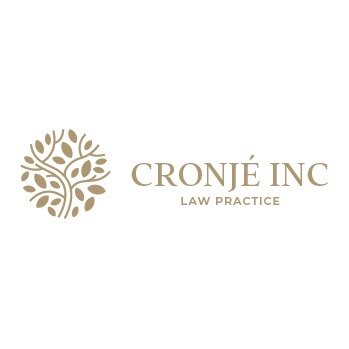Best Copyright Lawyers in Windhoek
Share your needs with us, get contacted by law firms.
Free. Takes 2 min.
List of the best lawyers in Windhoek, Namibia
About Copyright Law in Windhoek, Namibia
Copyright law in Windhoek, Namibia, is designed to protect the rights of creators by allowing them to control the use of their original works. This can include literary, artistic, musical, and other intellectual works. The primary goal of copyright legislation is to encourage creativity by ensuring that creators can maintain control over and benefit financially from their creations. In Namibia, copyright is governed by the Copyright and Neighbouring Rights Protection Act, 1994, which ensures that creators get due recognition and compensation for their efforts.
Why You May Need a Lawyer
There are several situations in which you might find it beneficial to seek legal advice regarding copyright in Windhoek, Namibia:
- You've created an original work and want to ensure your rights are protected under Namibian law.
- You're being accused of copyright infringement and need to understand your rights and obligations.
- You are planning to use copyrighted material in a project and need advice on whether it's allowable under fair use provisions.
- You need assistance with negotiating licensing agreements for the use of copyrighted materials.
- You're a business looking to safeguard intellectual property and require guidance on copyright registration.
Local Laws Overview
In Namibia, copyright protection is automatically conferred to original works without the necessity of registration. Key aspects of the law include:
- Duration: Copyright generally lasts for the creator's lifetime plus 50 years after their death.
- Protected Works: Includes literary works, musical compositions, films, sound recordings, broadcasts, and more.
- Exclusive Rights: The creator has the exclusive rights to reproduce, distribute, perform, or display the work publicly.
- Fair Use: Certain uses, such as for educational purposes or criticism, may be exempt from infringement, but legal advice is recommended for interpretation.
- Infringement: Unauthorized use of copyrighted materials can lead to legal penalties.
Frequently Asked Questions
What is copyright and who does it protect?
Copyright is a form of protection afforded by law to the creators of original works, granting them the exclusive rights to use and distribute their creations. It protects authors, musicians, artists, and other creators.
Do I need to register my work to get copyright protection in Namibia?
No, copyright protection is automatic upon the creation of a work. However, registration can serve as evidence in legal disputes.
What types of works are covered under Namibian Copyright law?
It covers a variety of works including literary, musical, and artistic works, as well as films, sound recordings, and broadcasts.
How long does copyright last in Namibia?
Copyright in Namibia generally lasts for the lifetime of the creator plus 50 years after their death.
What constitutes copyright infringement?
Copyright infringement involves using a protected work without permission in ways that violate the creator’s exclusive rights, such as reproducing or distributing the work.
Can anyone use copyrighted work for educational purposes without permission?
Fair use provisions do allow for some use of copyrighted works for educational purposes, but it's advisable to consult legal advice to understand the scope of these provisions.
What should I do if I’m accused of copyright infringement?
It is important to seek immediate legal advice to understand the claims, explore defenses, and resolve the dispute.
How can I legally use someone else's copyrighted material?
You typically need to obtain permission from the copyright holder or ensure the use falls under fair use exceptions.
What is a licensing agreement?
A licensing agreement is a legal contract that grants permission to use copyrighted material under defined conditions.
Where can I find more information about copyright laws applicable in Namibia?
Consulting with a legal expert or visiting governmental agencies related to intellectual property can provide more detailed information.
Additional Resources
If you need additional information or support regarding copyright, consider reaching out to the following resources:
- The Namibian Society of Composers and Authors of Music (NASCAM)
- The Ministry of Information and Communication Technology
- The Business and Intellectual Property Authority (BIPA)
- Local legal firms specializing in intellectual property law
Next Steps
If you require legal assistance with copyright in Windhoek, Namibia, consider the following steps:
- Identify your needs and gather all relevant documents related to your copyright issue.
- Contact a lawyer or legal firm specializing in copyright law for a consultation.
- Discuss your case and explore the legal options available to you.
- Ensure you understand the potential costs and timeframes associated with pursuing your case.
- Follow the advice of your legal counsel to protect your rights and interests.
Lawzana helps you find the best lawyers and law firms in Windhoek through a curated and pre-screened list of qualified legal professionals. Our platform offers rankings and detailed profiles of attorneys and law firms, allowing you to compare based on practice areas, including Copyright, experience, and client feedback.
Each profile includes a description of the firm's areas of practice, client reviews, team members and partners, year of establishment, spoken languages, office locations, contact information, social media presence, and any published articles or resources. Most firms on our platform speak English and are experienced in both local and international legal matters.
Get a quote from top-rated law firms in Windhoek, Namibia — quickly, securely, and without unnecessary hassle.
Disclaimer:
The information provided on this page is for general informational purposes only and does not constitute legal advice. While we strive to ensure the accuracy and relevance of the content, legal information may change over time, and interpretations of the law can vary. You should always consult with a qualified legal professional for advice specific to your situation.
We disclaim all liability for actions taken or not taken based on the content of this page. If you believe any information is incorrect or outdated, please contact us, and we will review and update it where appropriate.











